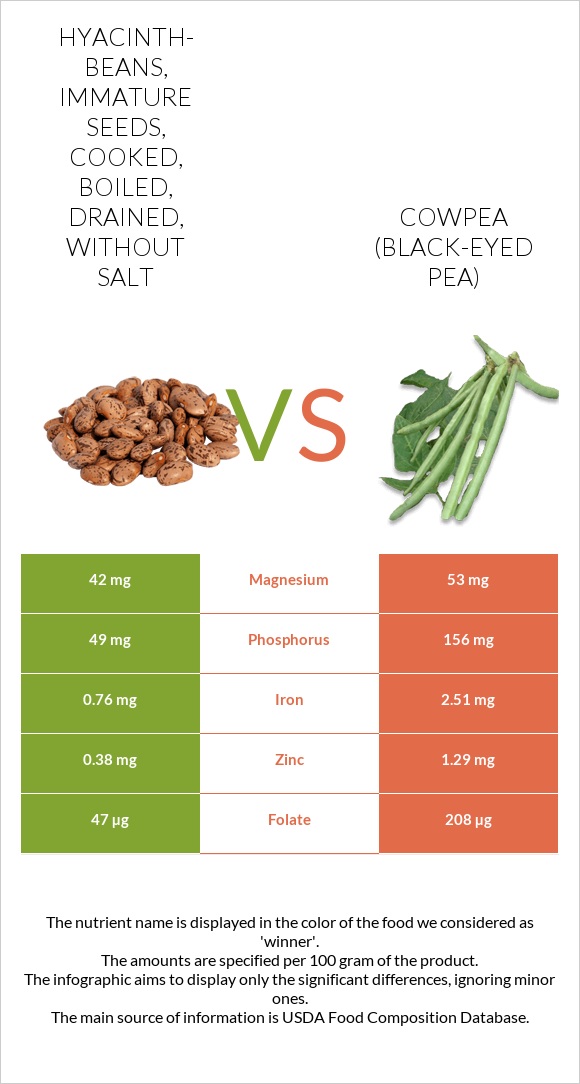Hyacinth-beans, immature seeds, cooked, boiled, drained, without salt vs. Cowpea (Black-eyed pea) — In-Depth Nutrition Comparison
Compare
How are hyacinth-beans, immature seeds, cooked, boiled, drained, without salt and cowpea (Black-eyed pea) different?
- Hyacinth-beans, immature seeds, cooked, boiled, drained, without salt is richer in vitamin C, while cowpea (Black-eyed pea) is higher in folate, copper, iron, phosphorus, vitamin B1, manganese, zinc, vitamin B5, and vitamin B6.
- Cowpea (Black-eyed pea) covers your daily need for folate, 40% more than hyacinth-beans, immature seeds, cooked, boiled, drained, without salt.
- Hyacinth-beans, immature seeds, cooked, boiled, drained, without salt contains 13 times more vitamin C than cowpea (Black-eyed pea). Hyacinth-beans, immature seeds, cooked, boiled, drained, without salt contains 5.1mg of vitamin C, while cowpea (Black-eyed pea) contains 0.4mg.
Hyacinth-beans, immature seeds, cooked, boiled, drained, without salt and Cowpeas, common (blackeyes, crowder, southern), mature seeds, cooked, boiled, without salt types were used in this article.
Infographic

Infographic link
Mineral Comparison
Mineral comparison score is based on the number of minerals by which one or the other food is richer. The "coverage" charts below show how much of the daily needs can be covered by 300 grams of the food.
| Contains more CalciumCalcium | +70.8% |
| Contains less SodiumSodium | -50% |
| Contains more MagnesiumMagnesium | +26.2% |
| Contains more IronIron | +230.3% |
| Contains more CopperCopper | +458.3% |
| Contains more ZincZinc | +239.5% |
| Contains more PhosphorusPhosphorus | +218.4% |
| Contains more ManganeseManganese | +126.2% |
| Contains more SeleniumSelenium | +56.3% |
Vitamin Comparison
Vitamin comparison score is based on the number of vitamins by which one or the other food is richer. The "coverage" charts below show how much of the daily needs can be covered by 300 grams of the food.
| Contains more Vitamin CVitamin C | +1175% |
| Contains more Vitamin AVitamin A | +600% |
| Contains more Vitamin B2Vitamin B2 | +60% |
| Contains more Vitamin B1Vitamin B1 | +260.7% |
| Contains more Vitamin B5Vitamin B5 | +675.5% |
| Contains more Vitamin B6Vitamin B6 | +334.8% |
| Contains more FolateFolate | +342.6% |
All nutrients comparison - raw data values
| Nutrient |  |
 |
DV% diff. |
| Folate | 47µg | 208µg | 40% |
| Fiber | 6.5g | 26% | |
| Copper | 0.048mg | 0.268mg | 24% |
| Iron | 0.76mg | 2.51mg | 22% |
| Phosphorus | 49mg | 156mg | 15% |
| Vitamin B1 | 0.056mg | 0.202mg | 12% |
| Manganese | 0.21mg | 0.475mg | 12% |
| Protein | 2.95g | 7.73g | 10% |
| Zinc | 0.38mg | 1.29mg | 8% |
| Vitamin B5 | 0.053mg | 0.411mg | 7% |
| Choline | 32.2mg | 6% | |
| Vitamin B6 | 0.023mg | 0.1mg | 6% |
| Vitamin C | 5.1mg | 0.4mg | 5% |
| Carbs | 9.2g | 20.76g | 4% |
| Vitamin B2 | 0.088mg | 0.055mg | 3% |
| Calories | 50kcal | 116kcal | 3% |
| Magnesium | 42mg | 53mg | 3% |
| Selenium | 1.6µg | 2.5µg | 2% |
| Calcium | 41mg | 24mg | 2% |
| Vitamin E | 0.28mg | 2% | |
| Vitamin A | 7µg | 1µg | 1% |
| Polyunsaturated fat | 0.01g | 0.225g | 1% |
| Vitamin K | 1.7µg | 1% | |
| Fats | 0.27g | 0.53g | 0% |
| Net carbs | 9.2g | 14.26g | N/A |
| Potassium | 262mg | 278mg | 0% |
| Sugar | 3.3g | N/A | |
| Sodium | 2mg | 4mg | 0% |
| Vitamin B3 | 0.48mg | 0.495mg | 0% |
| Saturated fat | 0.119g | 0.138g | 0% |
| Monounsaturated fat | 0.129g | 0.044g | 0% |
| Tryptophan | 0.095mg | 0% | |
| Threonine | 0.124mg | 0.294mg | 0% |
| Isoleucine | 0.201mg | 0.314mg | 0% |
| Leucine | 0.307mg | 0.592mg | 0% |
| Lysine | 0.203mg | 0.523mg | 0% |
| Methionine | 0.026mg | 0.11mg | 0% |
| Phenylalanine | 0.065mg | 0.451mg | 0% |
| Valine | 0.218mg | 0.368mg | 0% |
| Histidine | 0.124mg | 0.24mg | 0% |
Macronutrient Comparison
Macronutrient breakdown side-by-side comparison
Protein:
2.95 g
Fats:
0.27 g
Carbs:
9.2 g
Water:
86.9 g
Other:
0.68 g
Protein:
7.73 g
Fats:
0.53 g
Carbs:
20.76 g
Water:
70.04 g
Other:
0.94 g
| Contains more WaterWater | +24.1% |
| Contains more ProteinProtein | +162% |
| Contains more FatsFats | +96.3% |
| Contains more CarbsCarbs | +125.7% |
| Contains more OtherOther | +38.2% |
Fat Type Comparison
Fat type breakdown side-by-side comparison
Saturated fat:
Sat. Fat
0.119 g
Monounsaturated fat:
Mono. Fat
0.129 g
Polyunsaturated fat:
Poly. Fat
0.01 g
Saturated fat:
Sat. Fat
0.138 g
Monounsaturated fat:
Mono. Fat
0.044 g
Polyunsaturated fat:
Poly. Fat
0.225 g
| Contains less Sat. FatSaturated fat | -13.8% |
| Contains more Mono. FatMonounsaturated fat | +193.2% |
| Contains more Poly. FatPolyunsaturated fat | +2150% |